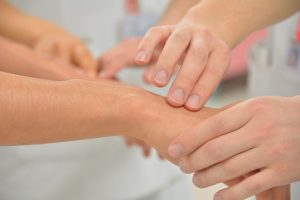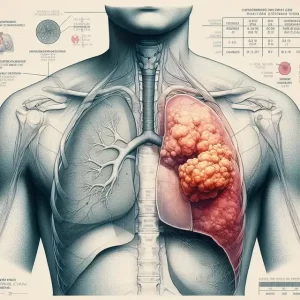Big data of 500K people tells you how long you sleep to be healthy!
- FDA Approved Opdualag: The First Immunotherapy Targeting LAG-3
- Cutaneous Reactions Following COVID-19 Vaccination: A Review of the Evidence
- Brief Intermittent Exercise Reduces Heart Disease and Death Risk
- Personalized Lung Tumor Chips Assess PD-1 Therapy Response
- Study Shows Prior Infection Offers Strong Immunity to Original COVID-19 Strain
- Chinese Food Products Dominate Korean Tables Amid Safety Concerns
Big data of 500K people tells you how long you sleep to be healthy!
- AstraZeneca Admits for the First Time that its COVID Vaccine Has Blood Clot Side Effects
- Was COVID virus leaked from the Chinese WIV lab?
- HIV Cure Research: New Study Links Viral DNA Levels to Spontaneous Control
- FDA has mandated a top-level black box warning for all marketed CAR-T therapies
- Can people with high blood pressure eat peanuts?
- What is the difference between dopamine and dobutamine?
- How long can the patient live after heart stent surgery?
New discovery: Big data of 500K people tells you how long you sleep to be healthy!
A recent study by the University of Colorado Boulder with a sample size of 500,000 showed that even if you do not smoke or exercise regularly, you are not genetically susceptible to cardiovascular disease , lack of sleep or excessive sleep. More will increase your risk of heart disease.
The research was published in the Journal of The American College of Cardiology. The study also found that for those with a high genetic risk of heart disease, healthy sleep duration can offset this risk.
How long is a healthy sleep?

6-9 hours of sleep can effectively reduce the risk of cardiovascular disease
In this study, Vetter and collaborators from Massachusetts General Hospital and the University of Manchester analyzed 461,000 British organisms between the ages of 40 and 69 who had never had a heart attack. The genetic information, self-reported sleep habits and medical records of participants in the UK Biobank were followed up for 7 years.
The results found that compared with people who slept 6 to 9 hours a night, people who slept less than 6 hours had a 20% higher chance of having a heart attack during the study. Those who slept for more than 9 hours had a 34% increase in probability. People who sleep too much have a higher risk than those who don’t get enough sleep!
When researchers individually studied people with a genetic predisposition for heart disease, they found that sleeping 6 to 9 hours a night can reduce the risk of heart attack by 18%.
The lead author of the study, Iyas Daghlas of Harvard Medical School, said: “This is encouraging news. Regardless of your genetic risk of heart attack, a healthy amount of sleep may reduce your risk of heart attack. , Just like healthy eating, non-smoking and other lifestyles.”
Researchers have long believed that there is a correlation between sleep and heart health, but because these studies are observational, that is, observing different groups of people to see who will get sick, it is difficult to determine whether lack of sleep will cause heart problems, and vice versa. The same is true.
Sleep for 10 hours, double the risk of heart disease
Many factors affect heart health and sleep at the same time, which makes it more difficult to determine cause and effect.
In this new study, the researchers used a large number of data sets from the British Biobank, combined with observation and genetic research, to ask this question in a different way.
After considering 30 factors such as body composition, physical activity, socioeconomic status, and mental health, they found that the length of sleep does have an impact on the risk of heart attack.
The longer people spend outside the 6-9 hour sleep range, the greater their risk of illness. For example, people who sleep 5 hours a night have a 52% higher risk of heart disease than people who sleep 7 to 8 hours a night, and people who sleep 10 hours a night have twice the risk of heart disease as people who sleep 7 to 8 hours a night. .
Short sleep genes may increase the risk of cardiovascular disease
The researchers used Mendelian randomization and then looked at the genetic profiles of participants to determine whether those who were born with insufficient sleep were more likely to develop heart disease. And 27 gene mutations are related to lack of sleep.
They found a similar pattern, and found that genetically affected short sleep is a risk factor for heart attack.
Vetter said: “This makes us more convinced that there is a causal relationship between the length of sleep and heart health, rather than other factors.”
This study did not explore the mechanism by which short or long sleep may increase the risk of heart attack, but previous studies have pointed out some explanations. Too little sleep affects the inner wall of arteries or endothelial cells, the bone marrow development of inflammatory cells, and also affects dietary patterns and food intake. These consequences will affect body weight and heart health. Too much sleep may also cause inflammation in the body, and inflammation is also related to cardiovascular disease.
Get a good night’s sleep, just do it
Today, when many young people sleep very bitterly, how can they sleep peacefully? Sleep healthy?
Scientists have discovered a long time ago that there is a correlation between frequent bathing and self-assessment of sleep quality. People who bathe often have better subjective sleep quality and older people who bathe sleep better. So the scientists conducted further investigations and found that bathing can improve night sleep and reduce excessive daytime sleepiness!
In addition, for patients with dementia, compared with afternoon (14:00-15:00), taking a bath twice a week at night (18:00-19:00) will improve the patient’s sleep status and reduce the number of patients with dementia Common symptoms of restlessness, wandering, and/or aggression.
Therefore , water-based passive body heating (PBHWB) through warm/hot shower or foot bath is recommended as a simple and low-cost non-drug treatment for insomnia.
Scientists also found that men prefer PBHWB in the form of foot baths than girls, and that this method is more effective in treating insomnia in winter than in summer.
After a systematic analysis of a number of related documents, the scientists concluded that hot showers, foot baths or full body baths between 1-2 hours before going to bed for 10 minutes can improve sleep, especially shorten the sleep latency ( SOL) to speed up falling asleep by an average of 10 minutes.
In addition, the analysis also showed that the optimal water temperature for PBHWB is between 40-42.5°C.
Just as exercise and a healthy diet can reduce the risk of heart disease, so can sleep.
references:
Celine Vetter et al. Sleep Duration and Myocardial Infarction . Journal of the American College of Cardiology (2019). DOI:10.1016/j.jacc.2019.07.022.
Big data of 500K people tells you how long you sleep to be healthy!
(source:internet, reference only)
Disclaimer of medicaltrend.org
Important Note: The information provided is for informational purposes only and should not be considered as medical advice.



